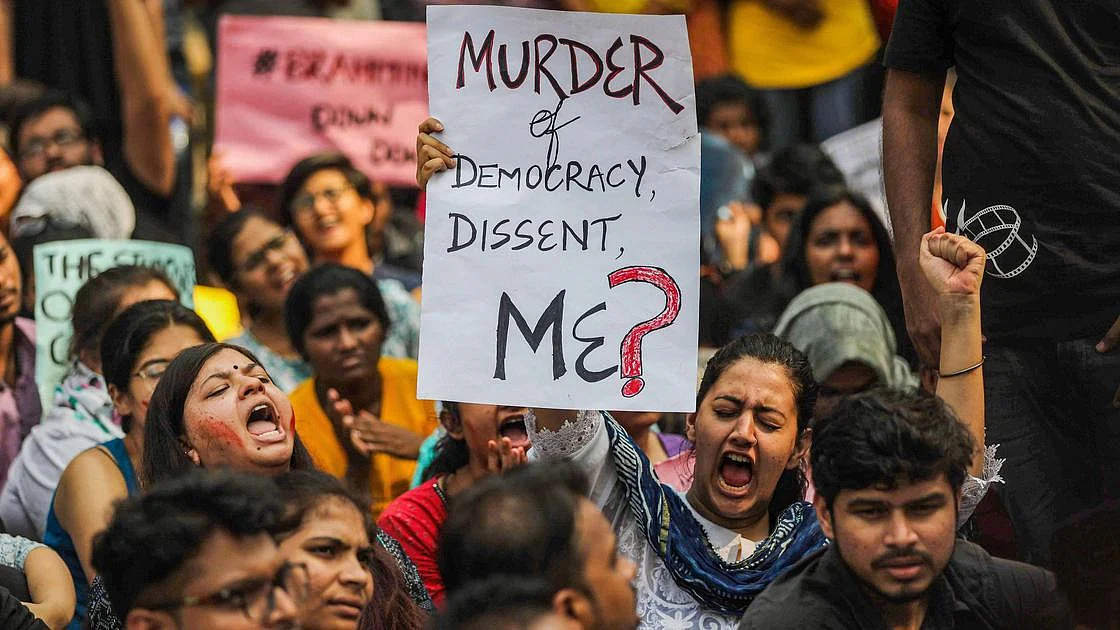On Independence Day, join the struggle to defend democracy
The democratic space for protest has shrunk drastically in the country. Citizens have experienced this in brutal ways since 2019

Father Stan Swamy spent his life working with Adivasis in Jharkhand in defence of their rights. He did not want their jal, jungle, zameen exploited by unscrupulous and corrupt vested interests. For this, he had to pay the ultimate price. On October 8, 2020, he was arrested in the Bhima Koregaon conspiracy case. He died waiting for a chance to clear his name.
The National Investigation Agency (NIA) judge DE Kothalikar denied him bail arguing that the “collective interest of the community” outweighed Fr. Stan’s right to personal liberty.
Yet, after Fr. Stan’s death, the NIA court denied bail to Anand Teltumbde, another member of the BK-16, the term that refers to advocates, artists, journalists and intellectuals imprisoned under the Bhima Koregaon conspiracy case. Now, the government is shifting some or all of the BK-16 out of the Taloja jail to an “unspecified prison” in Maharashtra.
The prison authorities, in a recent application, requested to transfer the male accused. The decision was taken solely by the NIA court without consulting the political prisoners or their families. The family members of Surendra Gadling, Sudhir Dhawale and Anand Teltumbde have challenged this decision. They allege that the purpose of the transfer is to separate the incarcerated in a brazen attempt to prevent them from speaking the truth.
The democratic space for protest has shrunk drastically in the country. Citizens have experienced this in brutal ways since 2019. Calculated destructions of democratic values and citizen’s rights take place at a frightening regularity. The way some of the followers of the ruling regime (including a BJP member who is a Supreme Court lawyer) ranted and raved against Muslims at Jantar Mantar on August 9, in the media glare, is a case in point. They did so with impunity, and though some got arrested after much public pressure, they know nothing will eventually happen.
On the other hand, the State has strategically weaponised the criminal justice system to erode democratic space and harass and punish those who dare to protest anti-people and anti-Constitutional government decisions.
In this situation, one looks up to the Courts to protect fundamental rights. Between 2015 and 2019, 7,050 people got arrested in 5,128 UAPA cases, but the conviction rate was only 2.20%, according to data presented in the Lok Sabha in March. This experience is visible because in several cases, Bhima Koregaon, Delhi riots, intellectuals, students, trade unionists, lawyers, human rights defenders and activists have been incarcerated.
The axe of state repression always hangs dangerously over those who differ from or dissent from the state. Adivasis, Dalits, labourers, farmers, migrant workers—all who raise their voices know the state only as an entity that punishes peaceful and democratic attempts that challenge the status quo. The Muslims are particularly vulnerable.
Minorities are systematically targeted to create a false narrative of anti-patriotism, internal terrorism and threat to the nation.
Earlier, the mainstream media allowed expression of protest and raised issues of injustice. Today, the media is the voice of the state, an important medium to popularise its narratives.
There are some rays of hope: some recent judgements and court orders have questioned the use of sedition law and the UAPA and reminded the prosecution of the detainees’ right to bail. Recent NIA court orders from Guwahati and the Delhi High Court (re: Akhil Gogoi, Asif Tanha, Devangana Kalita and Natasha Narwal) have offered devastating critiques of the UAPA. Such rulings are being regarded as a turning point in judicial circles. The mainstream press has taken note of this turn and broken with the narrative of the BJP government on these issues. These judgements vindicate, even defend, the right to dissent and opposition to the government.
Since 23 July, a National Campaign to Defend Democracy has started all over the country. Its first call was for ‘Justice for Father Stan Swamy’ and brought hundreds of people from all walks of life together in public protests, demanding that the courts clear his name.
A high point will be 15 August, Independence Day, when thousands will pledge to campaign to repeal draconian laws and protect our democracy. Several physical and virtual programmes are planned over the following weeks.
The National Alliance of People’s Movements (NAPM) has initiated a year-long nation-wide campaign, ‘Jan Azaadi 75: On the path to Freedom’ focussed on remembering the values of the freedom struggle, re-asserting the contributions of people’s movements over 75 years and resolutely strengthen our collective struggle for democracy, human rights, social and ecological justice. The campaign will conclude on 15 August 2022.
The current call to ‘defend democracy’ is in the similar vein as that of Gandhiji’s 1942 call of ‘do or die’: it is do or die for the people of India.
(IPA Service)
(Courtesy: The Leaflet)
Views are personal
Follow us on: Facebook, Twitter, Google News, Instagram
Join our official telegram channel (@nationalherald) and stay updated with the latest headlines